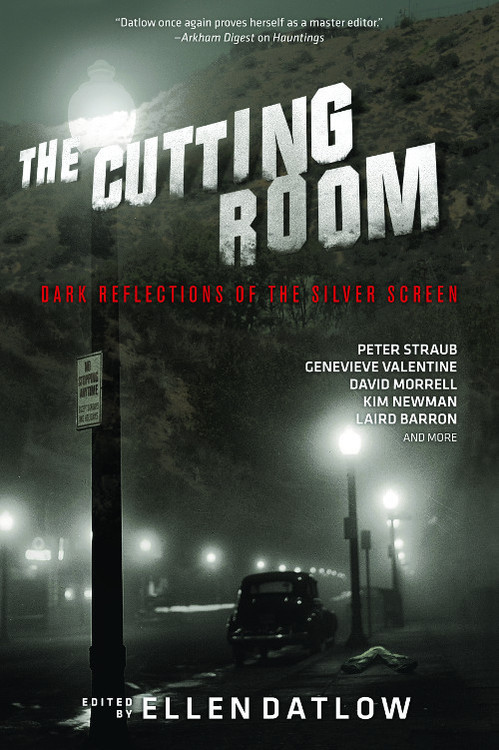THE CUTTING ROOM expounds on why films make excellent subjects for horror stories

In BLACK STATIC #45, Peter Tennant reviews award-winning, superstar editor Ellen Datlow’s THE CUTTING ROOM: DARK REFLECTIONS OF THE SILVER SCREEN.
First up we have THE CUTTING ROOM (Tachyon pb, 384pp, $16.95) and, with one exception, the contents of this film based anthology are reprints. After introductions by Genevieve Valentine and the editor expounding on our love of films and why they are such excellent subjects for horror stories, we get right into it with ‘The Cutter’ by Edward Bryant. It’s told from the viewpoint of a man looking back on his childhood when he worked in a movie theatre and the owner claimed to have cut various films so that they were different from how the director intended, this leading into a tragic and fatal attempt to edit life itself. A sad story and rich in nostalgia, it’s a piece that plays games with memory and reality, the interface between the two serving as a touchstone for the narrative, ending on a bittersweet note that makes you wonder if somebody is possessed of a secret power or simply insane.
<snip>
The one original story in the book, ‘Tenderizer’ by Stephen Graham Jones presents an overview of the career of a controversial film maker and then focuses on his latest project, deftly treading the line between audience expectation and artistic motivation, blurring the barrier between fact and fiction. Ultimately it’s a piece that examines not just the motivation of the character, but also our own as consumers and readers, the documentary style adding to this feeling that something more than a story is being offered. ‘Ardor’ is the title of a film, a porn version of Dracula, and the protagonist of Laird Barron’s story is hired to learn the fate of an actress who disappeared after starring in it, but what he learns leads to madness and death. It’s a convoluted and clever story, one in which ancient myth and the occult blend together and play off of each other, adding juice to what would otherwise be a routine detective story with hard boiled undertones. ‘Final Girl II: the Frame’ is a poem by Daphne Gottlieb expounding the role of the final girl and with asides on how to survive a horror movie, cleverly sending up the conventions of the genre.
In addition to those discussed here, the anthology also contains excellent stories by A. C. Wise, Gemma Files & Stephen J. Barringer, Gary McMahon, and Kim Newman, which I have omitted as I already reviewed them when they first appeared in other publications.
Read the rest of Tennant’s review, which includes coverage of every story save the four mention above, in BLACK STATIC #45.
And speaking of the four missing reviews, BLACK STATIC offers the four reviews on their website.
In Black Static #45 (out now) I review The Cutting Room: Dark Reflections of the Silver Screen, an anthology edited by Ellen Datlow, but didn’t comment on four of the stories as I had already reviewed them previously.
For the sake of completeness, I’ve decided to post my reviews of those stories as they originally appeared.
From my Black Static #33 review of The Best Horror of the Year Volume Four, edited by Ellen Datlow:-
‘Final Girl Theory’ by A.C. Wise details a man’s fascination with a horror film and what happens when he meets the woman who starred in it, the barrier between fiction and reality neatly dissected by the way in which the story is told, so that at times it almost reads like an essay in film criticism.
From my Black Static #19 review of The Best Horror of the Year Volume Two, edited by Ellen Datlow:-
The influence of Ringu is obvious in ‘each thing I show you is a piece of my death’ by Gemma Files and Stephen J. Barringer, with film makers discovering what appears to be a suicide or murder tape and the transferral of a mystery figure to all video, even television programmes. Written in a variety of forms, including interviews, memorandum, correspondence etc., this is an intriguing story with a wealth of detail and invention, and at its heart the fear of what our modern communication media may be doing to us, both their ability to shock and also to insulate and deaden our emotions. Technically the most ambitious of the stories, with the exception of John Langan’s marvellous ‘Technicolor’ (which I considered when reviewing the anthology Poe) I’d rate this the absolute best of what’s on offer here.
Read the rest of the reviews at BLACK STATIC.
For more info about THE CUTTING ROOM: DARK REFLECTIONS OF THE SILVER SCREEN, visit the Tachyon page.
Cover by Josh Beatman.
